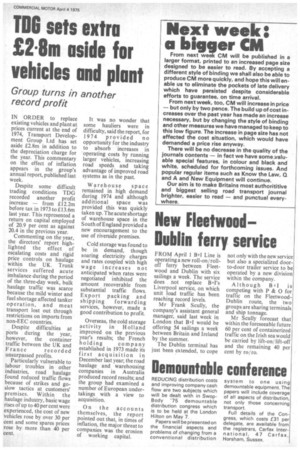TOG sets extra E2•1Im aside for vehicles and plant
Page 23

If you've noticed an error in this article please click here to report it so we can fix it.
Group turns in another record profit
IN ORDER to replace existing vehicles and plant at prices current at the end of 1974, Transport Development Group Ltd has set aside £2.8m in addition to the depreciation charge for the year. This commentary on the effect of inflation appears in the group's annual report, published last week.
Despite some difficult trading conditions TDG recorded another profit increase — from £12.2m before tax in 1973 to £13.6m last year. This represented a return on capital employed of 20.9 per cent as against 20.4 in the previous year.
Commenting on the year, the directors' report highlighted the effect of escalating costs and rigid price controls on haulage within the UK. Trunk services suffered acute imbalance during the period of the three-day week, bulk haulage traffic was scarce because the mild winter and fuel shortage affected tanker operation, and meat transport lost out through restrictions on imports from non-EEC countries.
Despite difficulties at ports during the year, however, the container traffic between the UK and France recorded unsurpassed profits.
Particularly vulnerable to labour troubles in other industries, road haulage found reduced traffic flows because of strikes and goslow tactics at customers' premises. Within the haulage industry, basic wage rises of up to 40 per cent were experienced, the cost of new vehicles rose by over 30 per cent and some spares prices rose by more than 40 per cent. It was no wonder that some hauliers were in difficulty, said the report, for 1974 provided no opportunity for the industry to absorb increases in ' operating costs by running larger vehicles, increasing road speeds and taking advantage of improved road systems as in the past.
Warehouse space remained in high demand during 1974 and although additional space was provided this was quickly taken up. The acute shortage of warehouse space in the South of England provided a new encouragement to the use of riverside premises.
Cold storage was found to be in demand, though soaring electricity charges and rates coupled with high wage increases not anticipated when rates were negotiated inhibited the amount recoverable from substantial traffic flows. Export packing and shipping forwarding services, however, made a good contribution to profit.
Overseas, the cold storage activity in Holland improved on the previous year's results; the French holding company established in 1973 made its first acquisition in December last year; the road haulage and warehousing companies in Australia produced record results; and the group had examined a number of European undertakings with a view to acquisition.
On the accounts themselves, the report pointed out that, in times of inflation, the major threat to companies was the erosion of working capital.




































































































